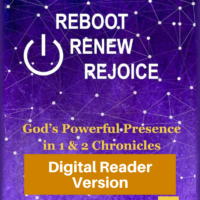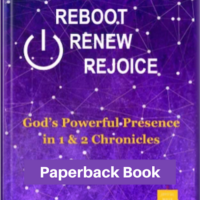2 Chronicles 17-21 • Recover the Truth of Your Heritage

AI was not used to generate this post.
Have Christians who really love God been strong influences in your life? How have they helped you to stay faithful to God in the midst of a culture that wants to rip you away from your faith? In the last post, we looked at what happens when you take the dangerous road of making excuses. This is post #8 in the Chronicles blog series. In this article, we will look at how recovering the truth of your Christian heritage motivates you to live God’s way. Jehoshaphat is our example.
Key Takeaways
- Jehoshaphat committed to seeking God and teaching his people about their Christian heritage.
- He led through personal example, actively discipling his people and organizing education about God’s Word.
- Despite his mistakes, Jehoshaphat maintained his dedication to God and instituted reforms to strengthen faith.
- His hands-on leadership, especially in prayer, brought blessings and unity to Judah during crises.
- Compromise with worldly practices led to consequences, highlighting the importance of wise decision-making.
Listen to this post as a similar podcast from our Reboot Renew Rejoice Bible Study covering the books of 1 and 2 Chronicles in the Old Testament. (11 lessons)
Knowing Your Heritage
I read this recently.
What we believe about our heritage influences our motivations and allegiance. No one knows this better than an enemy of either the church or America. Enemies attack by distorting history. They put their divisive slant on history by downplaying valuable beliefs that inspired many of our ancestors’ admirable feats while endlessly replaying their failures or human weaknesses. Why? People who are made to feel embarrassed or ashamed of their ancestors are more easily influenced to resent—and eventually abandon—their family, country, or faith. (Randy Guliuzza, “How Beautiful Is the Body of Christ,” Acts & Facts, December 2019, p. 18)
Those are strong words. We see this happening before our eyes today. People who are made to feel embarrassed or ashamed of their ancestors are more easily influenced to resent—and eventually abandon—their family, country, or faith. This is especially true for those who believe in Jesus Christ.
Knowing your history is very important. When we know the stories of faithful believers in our great God, even with their faults, we can counterbalance our culture’s attempts to distort our view of ourselves as Christians by belittling our past. But that requires a commitment to follow God and represent Him well. That also requires intentionally teaching the next generation about the true heritage of those who walked with God before them. That is what King Jehoshaphat did.
A Disciplemaking Leader
Ever since first being introduced to King Jehoshaphat, I have been drawn to the life of this man. He loved God and tried to be a disciplemaker for God with the people in his sphere of influence.
Jehoshaphat’s early commitment
The Lord was with Jehoshaphat because in his early years he walked in the ways his father David had followed. He did not consult the Baals but sought the God of his father and followed his commands rather than the practices of Israel. (2 Chronicles 17:3-4)
Jehoshaphat made an early commitment to seek God and follow His commands rather than following his father Asa who turned away from God. He also chose not to follow the practices of Israel. Know who was leading Israel at this time? Yep, the very wicked King Ahab and Queen Jezebel. Terrible leaders.
Jehoshaphat’s life provided a stark contrast between good and evil. As a boy and a young man, Jehoshaphat’s father Asa was committed to God. I think that certainly helped Jehoshaphat to get a good start. But as king, Jehoshaphat made the choice to continue following God all of his life unlike his father Asa who turned away from God.
God established the kingdom under Jehoshaphat’s control so much so that it made the surrounding lands fear the Lord more.
Devoted through discipling
The Bible says that Jehoshaphat’s heart was devoted to the ways of the Lord. Devoted. So, what did he intentionally do that showed he was devoted to the ways of the Lord? He organized the discipling of all his people by taking the Word of God to the people where they lived. That jumped out at me.
He sent officials, certain Levites, and a couple of priests with copies of the books of Moses (the first 5 books of the Bible). They went from town to town in Judah and taught the people. Intentional disciplemaking is going to the people so everyone can hear, not just those who travel to Jerusalem for festivals. As a king, Jehoshaphat fortified his nation spiritually as well as physically.
That reminds me of the old camp meetings of the 1800s. Itinerant preachers would travel the countryside holding church services in an outside setting of many frontier communities. They gathered wherever they could meet—by a stream, on a hillside, or in a valley. The preachers went to the people and shared the gospel of Jesus Christ with them. Many people were saved as they experienced God’s presence with them. Small churches would begin in those communities. Traveling preachers would visit those small churches every few weeks or so until the churches were able to have their own pastors. My husband’s great-grandfather was one of those traveling preachers in Mississippi.
A Hands-On Leader
Overall, Jehoshaphat was a hands-on leader with his people.
Teaching his people to follow God
Jehoshaphat lived in Jerusalem, and he went out again among the people from Beersheba to the hill country of Ephraim and turned them back to the Lord, the God of their fathers.” (2 Chronicles 19:4)
He personally visited all the regions of his kingdom to encourage his people to follow God only. That is a foreshadowing of what Jesus Christ did—the king teaching His people to know God and follow Him. Don’t you love that!
Jehoshaphat loved God so much that he went to the people to deliberately turn their hearts back to God from following idols. That is a hands-on leader.
Leading his people in prayer
In chapter 20, when Israel was threatened by enemies, the people of Judah came together in Jerusalem to seek help from the Lord. Jehoshaphat publicly led his people in prayer to their God. His prayer for deliverance is beautiful and humble. This is what he said to the Lord,
We don’t know what to do, but our eyes are upon you [God].” (2 Chronicles 20:12)
Isn’t that awesome! I feel that way on many days, don’t you? What a beautiful declaration of reliance on God!
The next verse really jumped out at me.
All the men of Judah, with their wives and children and little ones, stood there before the Lord. (2 Chronicles 20:13)
It was not just the men praying together for the nation. Families were praying together. The little children heard the king pray for deliverance. So, when God verbally answered, the whole family heard His Word and could give Him praise. I love that!
God sent an immediate answer through a man in the crowd. God’s answer basically was, “Don’t fight. Stand firm. Just be there. I have got it.”
Early in the morning they left for the Desert of Tekoa. As they set out, Jehoshaphat stood and said, “Listen to me, Judah and people of Jerusalem! Have faith in the Lord your God and you will be upheld; have faith in his prophets and you will be successful.” After consulting the people, Jehoshaphat appointed men to sing to the Lord and to praise him for the splendor of his holiness as they went out at the head of the army, saying: “Give thanks to the Lord, for his love endures forever.” As they began to sing and praise, the Lord set ambushes against the men of Ammon and Moab and Mount Seir who were invading Judah, and they were defeated. (2 Chronicles 20:22-24)
The army approached the battle field with a choir in front singing praise songs before their enemies. God caused the enemies to destroy each other. Then, the king and his army returned joyfully to Jerusalem and had a praise and worship service after the victory as well. What a hands-on leader!
God’s reboot of Judah through Jehoshaphat as they recovered the truth of their heritage brought blessing and rejoicing.
A Leader Who Made Mistakes Yet Did Not Abandon God
Bad decision #1
Like all humans, Jehoshaphat did not do everything right. In chapter 18, you can see that he made one really stupid decision. He gave his son in marriage to the daughter of Ahab and Jezebel. Remember them? They were the very wicked king and queen of Israel. Bad dudes. Some think Jehoshaphat did this to avoid being attacked by Israel. This situation is a case of a believer and a nonbeliever linked together in a joint venture, which usually results in disaster. In fact, Satan would use that marriage to try to wipe out David’s descendants later! Bad decision.
Bad decision #2
Then, Ahab wanted Jehoshaphat to join him in battle against a common foe. Jehoshaphat wanted to seek the Lord’s counsel first. He did not trust any of Ahab’s false prophets one bit and had the discernment to ask, “Is there a real prophet of God in the house?”
Here is the good news: God is never totally shut out of a place, no matter how dark! There were several true prophets still living in Israel, sort of like missionaries. So, Micaiah the prophet of God was summoned and revealed that God was going to end Ahab’s life. In fact, Micaiah said there is a committee meeting in heaven discussing how they were going to do it!
After hearing this news, Ahab attempted to hide himself during the battle. He was more afraid of the enemy Arameans than he was of the sovereign God. God’s plan for Ahab could not be stopped. Ahab was killed. Our sovereign God accomplished His purpose. You cannot hide from God.
Don’t help those who hate the Lord
But God was not happy with Jehoshaphat’s choice to go with Ahab. A prophet came to challenge him with a profound question that still applies to us today.
Should you help the wicked and love those who hate the Lord? (2 Chronicles 19:2)
Wow! That is a great question.
You see, that is what Jehoshaphat did. He joined forces with Ahab first through a marriage alliance then to fight an enemy that had not even attacked him.
My question to Jehoshaphat might have been this, “Why didn’t you [Jehoshaphat] ask God before you let your son marry Ahab’s daughter or allied yourself with Ahab in battle?” All those kings had prophets of God available to them for seeking God’s counsel on every personal and national decision. They had the power of God’s presence. And many chose not to use it!
If I had that kind of access today, would I also forget to use it? Hmmm. It goes back to what I talked about it in the last post. When we experience success, are we more likely to rely on our own experiences and ways of accomplishing something than to rely on God and His ways of approaching anything?
Should you help the wicked and love those who hate the Lord? (2 Chronicles 19:2)
Did he feel a kindred spirit with Israel and want to bring them all back together? Maybe so. This is what Jehoshaphat promised the godless Ahab,
I am as you are, and my people as your people, and we will be with you in the battle. (2 Chronicles 18:3)
Jehoshaphat was a nice guy. And he probably thought how good it would be to reunite the southern and northern kingdoms. So, he gave his son in marriage to Ahab’s daughter. He thought this compromise was for a good cause!
Compromise Is Dangerous
Dear reader, compromise is dangerous. Here are three things I want you to know about compromise:
1) Compromise with the world is usually subtle and tricky.
You get fooled with what look to be good causes that serve to lure you into the den of God’s enemies, to unite with those who hate Him. Beware the causes you support.
Scoundrels use wicked methods, they make up evil schemes to destroy the poor with lies, even when the plea of the needy is just. (Isaiah 32:7)
Scoundrels will take advantage of your tender heart to do whatever they can to suck you into their schemes. Beware the causes you support.
2) Compromise with the world grabs you through wrong relationships.
Notice how Jehoshaphat first gave his son in marriage, then accepted Ahab’s hospitality and foolishly gave his word about going into battle. He also did nothing as God’s prophet got slapped then thrown into prison.
Next, Jehoshaphat naively agreed to Ahab’s scheme of wearing his royal robes in battle while Ahab was disguised as a soldier. Foolish! Nothing like saying to your enemy, “Here I am. Kill me to win your battle!” Except for God’s grace, Jehoshaphat should have been killed!
3) Compromise with the world brings disastrous results.
I have already told you how the marriage alliance was used by Satan to attempt to wipe out David’s descendants. At the end of Jehoshaphat’s reign, he made another alliance. This time it was with Ahab’s son who happened to be his daughter-in-law’s brother. God was not happy about that, either, and brought disaster to their project. Some of us never learn the first time!
Bible teacher Steven Cole shared this commentary:
Christians are generally trusting people. When they start running with the world, they get outsmarted really quick! We get lured by the subtlety of the world and then we get locked in by forming wrong relationships that get us entangled even deeper. It is … right to form social relationships with unbelievers for the purpose of leading them to faith in Christ. Jesus was a friend of sinners in that sense. But you must be clear on your purpose, and you must not compromise your standards as a follower of Jesus Christ. “Do not be deceived,” Paul warns. “Bad company corrupts good morals” (1 Cor. 15:33). (Steven J. Cole, Lesson 3: When Christians Compromise with the World, Bible.org)
He is right!
A Leader Who Humbled Himself When Chastised
After being chastised by God, Jehoshaphat responded with humility and continued to serve God wholeheartedly, unlike his father Asa. Jehoshaphat accepted the reprimand from God for his poor decision and went on to institute further religious reforms. He set up a righteous justice system in the land based upon the Law of God, continuing to recover their religious heritage.
He appointed judges in the land, in each of the fortified cities of Judah. He told them, “Consider carefully what you do, because you are not judging for man but for the Lord, who is with you whenever you give a verdict. Now let the fear of the Lord be upon you. Judge carefully, for with the Lord our God there is no injustice or partiality or bribery.” In Jerusalem also, Jehoshaphat appointed some of the Levites, priests and heads of Israelite families to administer the law of the Lord and to settle disputes. (2 Chronicles 19:5-8)
Jehoshaphat did his best to disciple his people, and some responded with increased faith. He committed to follow God and represent Him well. He intentionally taught the next generation about the true heritage of those who walked with God before them. But a lot of the people just would not give up their God-substitutes. Faith is an individual response to the power of God’s presence.
Jehoshaphat was not perfect as a king. Just like us, he made a few poor decisions with lasting results. But his heart remained committed to God throughout his life—like David had done. The Bible says,
He walked in the ways of his father Asa and did not stray from them; he did what was right in the eyes of the Lord. (2 Chronicles 20:32)
God’s Mercy to Us When We Fail
God is so merciful to us when our hearts are pliable in His hands. He does not define us by our mistakes. Aren’t you grateful for that? I am.
Let us go back to the subject of blog #2 in this series, “Knowing Your Identity.” Knowing your identity is very important. You as a Christian can identify yourself this way,
“You are a child of God, one of God’s saints, totally loved and accepted by Him.”
Because you put your faith in Jesus Christ and choose to be His disciple, it could be said about you, “She did what was right in the eyes of the Lord.”
Our God’s powerful presence helps us to reboot our lives, renew our commitment to Him, and live a life of rejoicing as a result.
Let Jesus satisfy your heart with the power of His presence. Then, live in that power!
Read all the articles in our 1 and 2 Chronicles series. In the next post, we will look at the deception that can come through half-hearted obedience to God.
All of the above information is covered in the Reboot Renew Rejoice Bible Study of 1 and 2 Chronicles.
AI was not used to generate this post.


